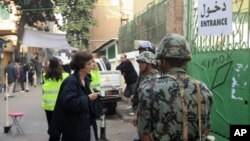Voters in Egypt's two largest cities - Cairo and Alexandria - and seven other provinces went to the polls Monday in the runoff for the first stage of the country's parliamentary elections, with Islamists looking to extend their commanding lead.
The runoffs that continue Tuesday are being held in all but four precincts where candidates secured the outright majority of more than 50 percent of votes in the first round.
Almost half of the 52 seats up for grabs are being contested by candidates from Egypt's two main Islamist groups: the Muslim Brotherhood's Freedom and Justice Party and the ultra-conservative Salafist Nour Party.
Wins for either faction will add to their tally of seats from separate votes for party lists. The two Islamist parties won a big majority of party-list ballots that voters cast at the same time they chose individual candidates last week.
Party-list results released Sunday put the Freedom and Justice party in the lead with 37 percent, with the Nour Party in second place at 24 percent and the liberal Egyptian Bloc in third with 13 percent.
Voter turnout for the runoffs was lower than the level seen last Monday and Tuesday, even as Egypt's election committee revised down the turnout figure for the first stage of the parliamentary election from 62 percent to 52 percent.
Residents of Egypt's remaining 18 provinces will cast ballots in the coming weeks in two stages of voting. Elections for the less powerful upper house of parliament will begin in late January and finish in March.
Muslim Brotherhood leaders called on their rivals to "accept the people's choice." Observers had expected the country's best-organized political movement to do well in the elections, the first since a popular uprising in February ousted autocratic President Hosni Mubarak.
The Brotherhood was officially banned for decades under Mubarak but its members continued to engage in politics as independents while establishing a nationwide network of charities popular with millions of impoverished people.
Egypt's Salafists shunned politics in the Mubarak era but decided to compete for parliament after the military council that took over from him promised free elections.
Followers of the Salafist Nour party advocate a strict interpretation of Islam that calls for segregation of the sexes, the full veiling of women and a ban on alcohol. The party's strong showing in the first round of voting has worried many liberal Egyptians who see it as a threat to their civil liberties.
Some information for this report provided by AP, AFP and Reuters.




